Find Help
More Items From Ergsy search
-

Divorce UK (England and Wales) | UK Divorce Process and Overview Explained PART 1 | BlackBeltBarrister
Relevance: 100%
-
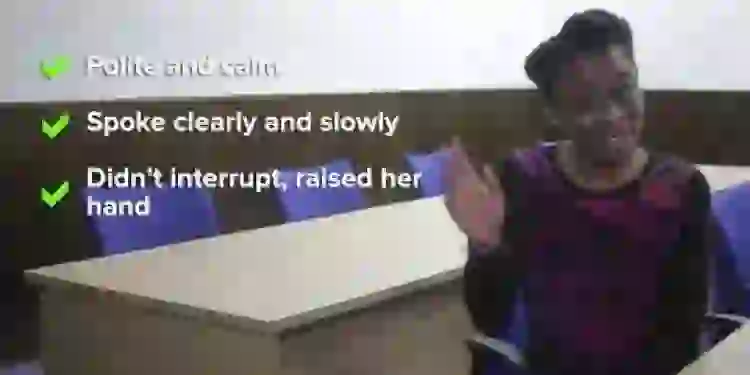
How to represent yourself in family court in England and Wales
Relevance: 56%
-

What about Stamp Duty in Wales?
Relevance: 48%
-

I'm Getting a Divorce | Tips From a Divorce Lawyer
Relevance: 46%
-
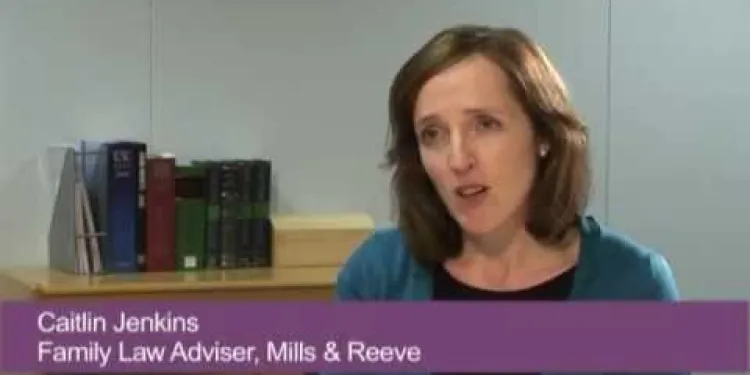
Divorce UK: What happens with the money in a divorce?
Relevance: 45%
-

A Guide to the Divorce Process
Relevance: 44%
-
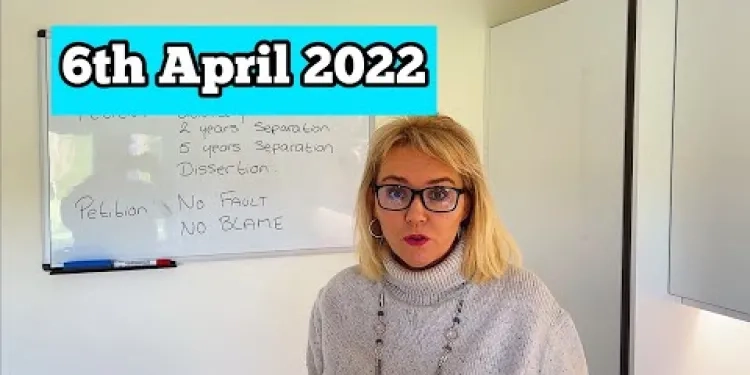
NO FAULT DIVORCE (What is there to know)
Relevance: 43%
-

Credit Union tour of Wales
Relevance: 42%
-

A History of The Church of England
Relevance: 41%
-

History of the Church of England
Relevance: 41%
-

Ultimate Guide to Financial Disclosure on Divorce in the UK
Relevance: 41%
-

Understanding Your Rights in Divorce Proceedings
Relevance: 40%
-
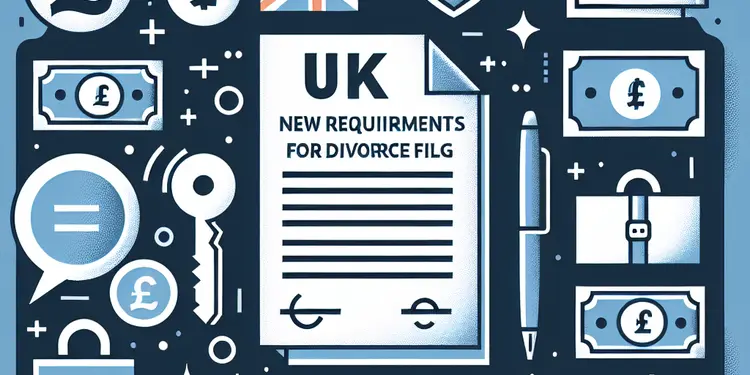
Are there any new requirements for divorce filings in 2026?
Relevance: 39%
-

How Was the Church of England Established
Relevance: 39%
-

Understanding Your Rights During Divorce Proceedings in the UK
Relevance: 39%
-

Can firefighter pension benefits be divided in a divorce?
Relevance: 38%
-

Divorce Step By Step - Form E - Capital
Relevance: 37%
-
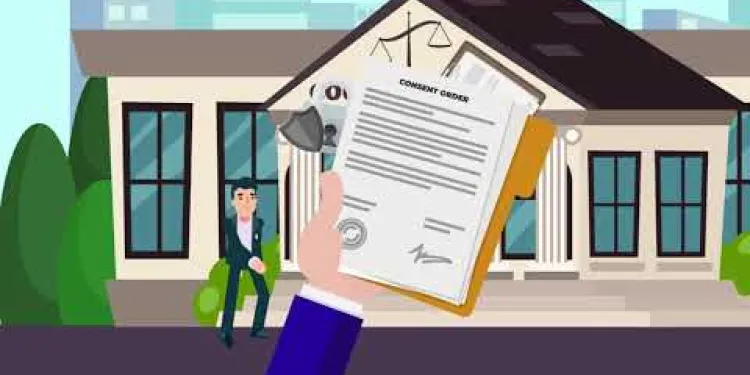
The 4 Steps to Agree a Financial Settlement on Divorce UK
Relevance: 36%
-
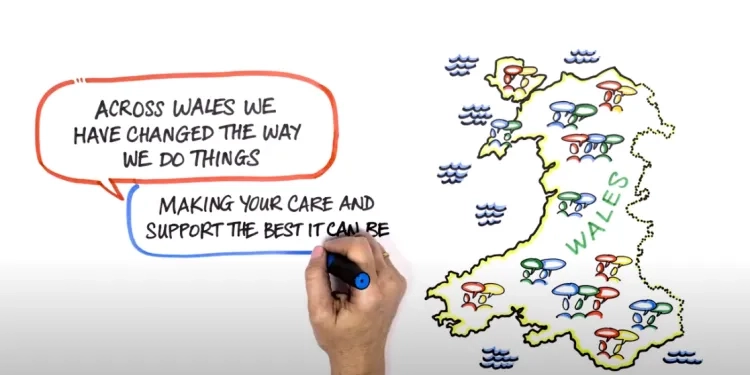
Social Services and Well-being (Wales) Act: Assessments
Relevance: 36%
-

Divorce - How To Rebuild Your Life After Losing Everything
Relevance: 35%
-

What is the current threshold for Stamp Duty in the UK?
Relevance: 32%
-

New endometriosis pill approved on NHS in England
Relevance: 30%
-

Are NHS dental charges different across the UK?
Relevance: 30%
-

Calls for Urgent Action on GP Shortages Across Rural England
Relevance: 30%
-

What is Stamp Duty in the UK?
Relevance: 25%
-

What agencies monitor and regulate sewage pollution in the UK?
Relevance: 24%
-

Who regulates the performance and compliance of UK water companies?
Relevance: 24%
-

How is Stamp Duty calculated in the UK?
Relevance: 23%
-

How do I pay Stamp Duty in the UK?
Relevance: 21%
-

Are school meals free for all students in the UK?
Relevance: 19%
-

Is there a Stamp Duty exemption for first-time buyers in the UK?
Relevance: 19%
-

Which body is responsible for enforcing refunds by UK water companies?
Relevance: 18%
-

Are there legal guidelines for sewage discharge into UK waters?
Relevance: 18%
-

What properties are exempt from Stamp Duty?
Relevance: 18%
-

When is Stamp Duty payable in the UK?
Relevance: 18%
-

Are there different rates of Stamp Duty in the UK?
Relevance: 18%
-

Navigating Changes in Family Law Post-Brexit
Relevance: 18%
-

Who provides the funding for free school meals in the UK?
Relevance: 17%
-

How does council tax relate to wealth in the UK?
Relevance: 17%
-

Are there any changes to spousal support regulations in 2026?
Relevance: 17%
Divorce in the UK (England & Wales): Process and Overview Explained
Understanding the Grounds for Divorce
In England and Wales, the legal requirements for divorce are governed by the Matrimonial Causes Act 1973. To file for divorce, you must demonstrate that the marriage has irretrievably broken down. This is established by proving one of the following five grounds: adultery, unreasonable behaviour, desertion, two years' separation with consent, or five years' separation without consent. Understanding these grounds can guide you in deciding the most appropriate basis for your divorce petition.
The Divorce Petition
The first formal step in the divorce process is filing a divorce petition (Form D8). The petitioner, who initiates the divorce, must provide details of the grounds for the divorce and any children of the marriage. The petition is filed with the family court, accompanied by the appropriate fee. Once submitted, the court issues the petition and sends a copy to the respondent, who has 7 to 21 days to acknowledge receipt and indicate whether they intend to contest the divorce.
Responding to the Divorce Petition
The respondent is required to complete and return an acknowledgment of service form, which confirms receipt of the divorce petition and states whether they agree or contest the grounds. If unchallenged, the process moves forward smoothly. If contested, additional steps and potentially court hearings will be necessary to resolve disputes. The interaction between both parties significantly influences the timeline and complexity of the divorce proceedings.
Decree Nisi and Decree Absolute
Once the petition is accepted, the petitioner applies for a Decree Nisi, a provisional decree indicating that the court sees no reason why the divorce should not be granted. Both parties do not necessarily have to attend the court unless there are issues to resolve. Six weeks after the Decree Nisi, the petitioner can apply for a Decree Absolute, which finalises the divorce. Upon issuance of the Decree Absolute, the marriage is legally ended, and both parties are free to remarry.
Financial Settlements and Child Arrangements
While the divorce process itself deals with the legal aspect of ending the marriage, it’s crucial to also consider financial settlements and arrangements for children. These matters are often settled through negotiation, mediation, or court orders if the parties cannot reach an agreement. The court aims to ensure that financial divisions and child arrangements are fair and in the best interests of all parties, particularly any children involved.
This comprehensive overview offers insights into the UK divorce process within England and Wales. Understanding each step, from establishing grounds to securing the Decree Absolute, can help navigate this challenging period with greater clarity and assurance.
Divorce in the UK: What You Need to Know
Reasons for Divorce
In England and Wales, there are rules to follow if you want a divorce. These rules come from a law called the Matrimonial Causes Act 1973. To get a divorce, you need to show that the marriage has broken down for one of these reasons:
- Your partner has cheated (adultery).
- Your partner has behaved badly (unreasonable behaviour).
- Your partner left you alone for no good reason (desertion).
- You have lived apart for 2 years and both agree to divorce.
- You have lived apart for 5 years, even if your partner does not agree.
Knowing these reasons can help you choose the best way to ask for a divorce.
Starting the Divorce
The first step is to fill out a form called a divorce petition (Form D8). This is done by the person who starts the divorce, called the petitioner. You need to say why you want the divorce and include details about any children. You send this form to the family court with a fee. The court will then send a copy to your partner, called the respondent. They have 7 to 21 days to reply and say if they agree with the divorce.
What Your Partner Needs to Do
Your partner must fill out a form called an acknowledgment of service. This form shows they received the divorce papers and whether they agree to the divorce. If they agree, the process is easier. If they do not agree, it may take longer and might need a judge to help sort things out. How both of you handle this affects how long and simple the process will be.
Decree Nisi and Decree Absolute
Once the court accepts the divorce papers, you apply for a Decree Nisi. This is a paper from the court that says the divorce can go ahead. Most of the time, you don't need to go to court unless there are problems. Six weeks later, you can apply for a Decree Absolute. This paper officially ends the marriage. After this, you are both free to marry someone else if you want to.
Money and Children
The divorce itself is about ending the marriage only. You also need to think about how you will share money and what happens with the children. These things can be sorted out by talking to each other, having someone to help you both agree (mediation), or by the court if needed. The court wants to make sure things are fair, especially for the children.
This guide helps you understand the steps for getting a divorce in England and Wales. Knowing what to do can make this tough time a little easier.
Frequently Asked Questions
What are the grounds for divorce in England and Wales?
The only ground for divorce is the irretrievable breakdown of the marriage. This can be proven by one of five facts: adultery, unreasonable behaviour, desertion, living apart for more than two years with consent, or living apart for more than five years without consent.
How long do I have to be married before I can file for divorce?
You must be married for at least one year before you can file for divorce in England and Wales.
How do I start the divorce process?
The divorce process starts with filing a divorce petition at the family court. This can be done online or by submitting a paper form.
Do I need a solicitor to get a divorce?
While it is not a legal requirement to have a solicitor, it is often advisable to seek legal advice to ensure your interests are protected.
How much does it cost to get a divorce?
The court fee for filing a divorce petition is currently £593. You may also have to pay for legal advice and representation, which can vary widely in cost.
Can I get a divorce if my spouse does not consent?
Yes, you can still obtain a divorce even if your spouse does not consent, provided you can prove irretrievable breakdown by one of the accepted facts.
How long does the divorce process take?
The length of the process can vary, but typically it takes between 4 to 6 months if both parties agree and there are no delays.
What is a Decree Nisi?
A Decree Nisi is a provisional court order that states the court sees no reason why you cannot divorce. It is the step before the final Decree Absolute.
When will my divorce be finalised?
Your divorce is finalised when the court grants the Decree Absolute, which can be applied for six weeks and one day after the Decree Nisi.
What happens to our joint assets during a divorce?
Joint assets need to be divided fairly. This can be agreed upon between both parties or through a court order if an agreement cannot be reached.
Can I change my name after a divorce?
Yes, you can change your name after a divorce, and you might need your Decree Absolute and marriage certificate as evidence for this.
Will I have to go to court to get divorced?
Many divorces are processed without the need to attend court. However, court appearances may be necessary for contested cases or to resolve financial issues.
How is child custody decided in divorce proceedings?
Child custody is determined based on the best interests of the child. If parents cannot agree, the court will decide considering factors like the child's welfare, wishes, and both parents' contributions.
Can I refuse to grant my spouse a divorce?
You can contest the divorce by stating your reasons, but the court will ultimately decide whether the divorce will be granted based on the evidence presented.
Do I need to provide evidence of my reasons for divorce?
Yes, you need to provide evidence to support your claims if your divorce is based on adultery, unreasonable behaviour, or desertion. For separation, you need to demonstrate the duration you have lived apart.
Why do people get divorced in England and Wales?
The only reason to get a divorce is when a marriage cannot be fixed. You can show this in five ways: cheating (adultery), behaving badly (unreasonable behaviour), leaving your partner (desertion), living away from each other for over two years if both agree, or living apart for over five years if one partner does not agree.
How long do I have to wait to get a divorce after getting married?
If you are married and want to get a divorce, you might need to wait for a certain time. In many places, you have to be married for at least one year before you can ask for a divorce.
If you have questions or need help, you can talk to someone who knows about these rules, like a lawyer. Reading with a friend or using a reading app can also help you understand better.
You need to be married for at least one year before you can ask for a divorce in England and Wales.
How do I start a divorce?
The first step to getting a divorce is to fill out a special form called a divorce petition. You send this form to the family court. You can fill it out online or use a paper form.
Do I need a lawyer to get a divorce?
If you want to get a divorce, you might wonder if you need a lawyer. A lawyer is someone who can help with legal things.
You do not always need a lawyer to get a divorce. But here are some helpful things to think about:
- Talk to a lawyer if you have kids or a house, or if you and your partner cannot agree.
- A lawyer can help you understand your rights.
- If you do not have a lawyer, you can look for online guides about divorce.
Some tools can help, like:
- Family support services: They can give advice and help.
- Online resources: Websites that explain divorce steps.
You do not have to have a lawyer. But it is often a good idea to talk to one. A lawyer can help make sure that you are safe and okay.
How much money do you need to get a divorce?
Divorce is when two people who are married decide to stop being married. It can cost money to get a divorce.
Talk to someone who knows about divorce to find out how much it might cost for you.
Here are some tools that might help:
- Ask for help from a family member or friend.
- Look for websites that explain divorce in simple words.
- Use videos that talk about divorce in an easy way.
You need to pay £593 to start a divorce in court. This is called a court fee. You might also need to pay a lawyer for help, and this can cost different amounts.
Can I get a divorce if my husband or wife says no?
If you want a divorce, but your husband or wife does not agree, you can still ask for one. Here are some things you can do to help:
- Talk to a Lawyer: A lawyer can tell you what to do and help you through the process.
- Mediation: A special person called a mediator can help you and your spouse talk and find a solution.
- Counseling: Talking to a counselor might help you both understand each other better.
Remember, it can take time, but you can still get a divorce even if your spouse says no.
Yes, you can still get a divorce even if your husband or wife does not agree. You just need to show the marriage is broken using one of the accepted reasons.
How long does it take to get a divorce?
Getting a divorce is when a married couple decides to break up. This can take some time. It usually takes around 4 to 6 months, but it might be longer if there are problems.
If you need help, you can ask someone you trust to explain things. You can also use tools like a calendar to keep track of the time.
The process can take a long time. Usually, it takes 4 to 6 months. This is if everyone agrees and there are no hold-ups.
What is a Decree Nisi?
A Decree Nisi is a paper from the court.
This paper says that you can get a divorce. But you are not divorced yet.
This is an important step before you can finish a divorce.
You will get the final paper later. Then you will be divorced.
Tips:
- Ask someone to help if you do not understand the paper.
- Use a dictionary for hard words.
A Decree Nisi is a step in getting a divorce. It is a paper from the court that says there is no reason you cannot divorce. It comes before the final paper, called the Decree Absolute.
When will my divorce be finished?
A divorce is when two people who are married decide not to be married anymore.
Here is how a divorce happens:
- First, you ask for a divorce. This is called "filing for divorce".
- Then, you might need to talk about things like where the children will live or how to share money.
- After that, a judge will look at the agreement and say it is okay.
- At last, the judge will say the divorce is finished.
Each divorce is different, so the time it takes can change. Some might take a few months, others might take longer.
If you want help, you can:
- Talk to a lawyer. They can explain the steps and help you.
- Use a calendar to keep track of important dates.
- Ask someone you trust to help you understand the process.
Your divorce is finished when the court gives you a paper called the Decree Absolute. You can ask for this paper six weeks and one day after you get a paper called the Decree Nisi.
What happens to things we own together if we get a divorce?
When people share things like money or property, they need to be split fairly when they part ways. Both people can decide how to share these things. If they can't agree, a judge will help decide.
Can I change my name after a divorce?
Yes, you can change your name after a divorce. It is something you are allowed to do.
If you want to change your name, you might need some help or guidance. Here are some things that can help:
- Ask a trusted adult or friend for help with the paperwork.
- Look for guides or forms online that can make the process easier.
- Visit a local office that deals with name changes, and ask them questions.
Remember, changing your name is a big decision. Take your time and make sure it’s what you really want.
Yes, you can change your name after a divorce. You might need two important papers for this: your Decree Absolute and your marriage certificate.
Do I need to go to court to get a divorce?
Most of the time, people do not have to go to court to get a divorce. But sometimes, they might have to if they cannot agree on things or if there is a money problem.
How do parents share time with their child after a divorce?
When parents get divorced, they need to decide who the child will live with and how they will share time with the child. This is called "child custody."
The judge in a court helps make this decision. The judge thinks about what is best for the child.
Tools like pictures, drawing, or talking with a helper can make it easier to understand.
If you have questions, it's a good idea to ask a grown-up you trust to explain it to you.
Deciding who takes care of a child is based on what's best for them. If parents can't agree, a judge will decide. They look at things like what the child wants, what is good for the child, and how much each parent helps.
If reading is hard, you can try:
- Using audio books to listen to instead of reading.
- Asking a friend or teacher to help explain.
- Taking breaks to rest your eyes.
Can I say no to a divorce from my husband or wife?
You can tell the court your reasons if you don't want the divorce. But in the end, the court will decide if the divorce happens or not. They will look at the proof everyone gives.
Do I need to show why I want a divorce?
Yes, you must show proof if your divorce is because of cheating, bad behavior, or if someone left for good. If you are separating, you need to show how long you've been living apart.
Useful Links
This website offers general information and is not a substitute for professional advice.
Always seek guidance from qualified professionals.
If you have any medical concerns or need urgent help, contact a healthcare professional or emergency services immediately.
Some of this content was generated with AI assistance. We’ve done our best to keep it accurate, helpful, and human-friendly.
- Ergsy carfully checks the information in the videos we provide here.
- Videos shown by Youtube after a video has completed, have NOT been reviewed by ERGSY.
- To view, click the arrow in centre of video.
- Most of the videos you find here will have subtitles and/or closed captions available.
- You may need to turn these on, and choose your preferred language.
- Go to the video you'd like to watch.
- If closed captions (CC) are available, settings will be visible on the bottom right of the video player.
- To turn on Captions, click settings .
- To turn off Captions, click settings again.
More Items From Ergsy search
-

Divorce UK (England and Wales) | UK Divorce Process and Overview Explained PART 1 | BlackBeltBarrister
Relevance: 100%
-

How to represent yourself in family court in England and Wales
Relevance: 56%
-

What about Stamp Duty in Wales?
Relevance: 48%
-

I'm Getting a Divorce | Tips From a Divorce Lawyer
Relevance: 46%
-

Divorce UK: What happens with the money in a divorce?
Relevance: 45%
-

A Guide to the Divorce Process
Relevance: 44%
-

NO FAULT DIVORCE (What is there to know)
Relevance: 43%
-

Credit Union tour of Wales
Relevance: 42%
-

A History of The Church of England
Relevance: 41%
-

History of the Church of England
Relevance: 41%
-

Ultimate Guide to Financial Disclosure on Divorce in the UK
Relevance: 41%
-

Understanding Your Rights in Divorce Proceedings
Relevance: 40%
-

Are there any new requirements for divorce filings in 2026?
Relevance: 39%
-

How Was the Church of England Established
Relevance: 39%
-

Understanding Your Rights During Divorce Proceedings in the UK
Relevance: 39%
-

Can firefighter pension benefits be divided in a divorce?
Relevance: 38%
-

Divorce Step By Step - Form E - Capital
Relevance: 37%
-

The 4 Steps to Agree a Financial Settlement on Divorce UK
Relevance: 36%
-

Social Services and Well-being (Wales) Act: Assessments
Relevance: 36%
-

Divorce - How To Rebuild Your Life After Losing Everything
Relevance: 35%
-

What is the current threshold for Stamp Duty in the UK?
Relevance: 32%
-

New endometriosis pill approved on NHS in England
Relevance: 30%
-

Are NHS dental charges different across the UK?
Relevance: 30%
-

Calls for Urgent Action on GP Shortages Across Rural England
Relevance: 30%
-

What is Stamp Duty in the UK?
Relevance: 25%
-

What agencies monitor and regulate sewage pollution in the UK?
Relevance: 24%
-

Who regulates the performance and compliance of UK water companies?
Relevance: 24%
-

How is Stamp Duty calculated in the UK?
Relevance: 23%
-

How do I pay Stamp Duty in the UK?
Relevance: 21%
-

Are school meals free for all students in the UK?
Relevance: 19%
-

Is there a Stamp Duty exemption for first-time buyers in the UK?
Relevance: 19%
-

Which body is responsible for enforcing refunds by UK water companies?
Relevance: 18%
-

Are there legal guidelines for sewage discharge into UK waters?
Relevance: 18%
-

What properties are exempt from Stamp Duty?
Relevance: 18%
-

When is Stamp Duty payable in the UK?
Relevance: 18%
-

Are there different rates of Stamp Duty in the UK?
Relevance: 18%
-

Navigating Changes in Family Law Post-Brexit
Relevance: 18%
-

Who provides the funding for free school meals in the UK?
Relevance: 17%
-

How does council tax relate to wealth in the UK?
Relevance: 17%
-

Are there any changes to spousal support regulations in 2026?
Relevance: 17%


